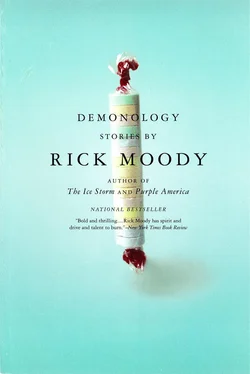— I’m supposed to be having a party in less than an hour. The guests are coming really soon. Where’s my boyfriend? He’s supposed to be here.
— You just need a credit card is all.
So his neighborliness revealed itself as an attempt to get to her credit cards, which, in any event, were her parents’ credit cards, namely a Visa card issued by her parents’ bank and an American Express Platinum. All of the money, or requests for money, flowed back to that originary trunk, as all her parents’ money flowed back to the central bank and its charter for which Washington voted, when president, in 1791. All money referred to the original money of British feudal lords, which, transferred, supplemented, by plastic cards, karats, ducats, nuggets of gold, stock certificates, bonds, computer printouts of mutual fund holdings, was nonetheless merely a recognition of the origin of money, held by people who did not tan well and who did not need to apply juices to their pale veneers. She assumed, moreover, that all original money was stewarded by men, because women were held to be forgetful and given to mercurial temper and who were anyway inclined to leave the control of money to others, who had pockets. The men were all in a bar someplace, mired in self-hatred, flattering courtesans who would look hideous in the morning, they were pondering the box-office dominance of a certain Austrian bodybuilder whose accent made him sound startlingly like a fascist; it was almost impossible not to imagine that this Austrian, who may possibly have used juices to tan his veneer, was a fascist. She used to come home at night and Gerry would be sitting at the kitchen table with the local phone book open and she would ask what he was doing, and he would say, Reading the phone book. She would ask why he was reading the phone book. He had no explanation, he was just reading, and when again they were attempting to think of people to invite to the Mad Son Electric Opening Gala, he’d turned to reading the white pages, unable to make contact with her in a way that satisfied either of them, uncertain, even, what it was to make contact; Gerry improvised, Looking for rock stars, because there were these Hoboken bands and they just lived up the street, they all had day jobs, one guy copyedited for one of the larger publishing houses, and you used to see them on the buses going into Port Authority and Gerry was thinking he was going to invite these celebrities to the Mad Son Electric Opening Gala, but then he never did, nothing came of it.
— You don’t have your own credit card? M. J. said. — Because I’m not sure I want to sacrifice one of my credit cards for a lock. I mean, they’re not really mine, anyway. They’re for emergency use, and if I lost one, I’d have to notify the bank.
— Suit yourself, the tan man said.
— I don’t give a hoot if he was the greatest singer of the century! Mrs. Vincenzo shouted. Aaron rocked beside her in recognition of her oratory. — I’m saying he ought to come back and visit the town where he got raised up. Doesn’t make good sense. My boy was in some trouble here in town before he went off to the services and I still lived here with the neighbors and the friends who seen what I’ve been through. They understood my troubles. This is where I’m from. I’m not going to be from anywhere else.
— Mrs. Vincenzo, said one of the paramedics, — would you be willing to get into the ambulance now?
A dispute broke out between the kids playing cards, a black kid and a white kid and soon several others had gotten into it, and they held the white kid down and they pulled off his sneakers, probably cost $37.50 apiece, tied two laces together, the kid cried out No! No! but they held him down. Now M. J. noticed that harvest of sneakers, draped on the power lines. The instigators flung the sneakers up, tried to get them to drape over the lines. Please, no, those are brand-new sneakers! They were calling him faggot, because what else did you call a kid, you called him a faggot, that was the worst thing you could be. She looked at Aaron to see if he registered this, whether a lifetime of being mostly hated by your peers was enough to be a predictor of madness and alcoholism, but Aaron had wandered toward the crosstown bus and was now disputing its route with the driver.
— Must not use the crosstown bus very often, the driver said, — because it’s been some years this bus here been going down Madison. Other bus goes down Washington, so now people on this side of town, they don’t have to walk so far, like the people on the other side, they mostly don’t have to walk so far.
— Maybe it’s not your house, the guy from the station wagon remarked.
— What did you say? said M. J.
— I mean maybe you’re trying to get me to bust you into a house doesn’t belong to you.
— Want to see my driver’s license?
— Could be this isn’t even your street. Maybe somebody else lives here. Drivers license? Hey, you can buy one of those.
— That’s really rude. What you’re saying is just rude.
The face of the tanned guy (she supposed now that he was called Norbert), indicated a substantial cruelty heretofore concealed. She could tell that he would not be a resource in her hour of need. Meanwhile, the cars on the street in a furious klaxoning. The ambulance, the crosstown bus parked side by side. Police beside paramedics. A fireman wandered through asking if his services were needed. At the corner, a traffic cop who had appeared to wave rush-hour flow onto Seventh Street had recognized a friend among the assembled. He stepped out of the intersection to chat with this rotundity of sweatsuit. Traffic languished. Next, there was a street vendor, one of Hoboken’s sellers of ices, with a cart and a dozen bottles, chipping away with his pick, loading on raspberry syrup; around him three or four friends heaving crimson dice, talking fast in a froth of Spanish and English: results of first games of the football season, difficulties of wives, how a couple of Anglos in the wrong neighborhood gonna jack up the rents, this town where they had gotten halfway through demolishing the ferry terminal so that they could put up top-dollar developments like amusement arcades, shopping centers, luxury condos, you could neither take a ferry from the terminal nor use the location for anything else; it was the Committee for a Better Waterfront versus the people who had lived there since they were kids, played stickball on the blacktop over by Observer Highway; the people who lived there were mainly for devel opment, even if it brought nothing to them but wrecking balls and Food Courts; and this very theme had now erupted on Madison Street, before the flickering holiday lights of the Mad Son Electric Gallery of Hoboken, whereupon a BMW-owner, wearing Ray-Bans and a yellow power tie, climbed out of his convertible, and took it up with the men by the street vendor, and yet they all agreed, everyone agreed, You think it’s a bad idea to have a beautifully designed series of buildings down there, and some shops, with the Empire State Building, right cross the water? The men, in their basketball jerseys and worn baseball caps, jeans and construction boots, wordless, That’s a good idea, the young urban professional continued, which will improve real estate values in the neighborhood. Its better for the tax base. There will be jobs. Strapped himself back into his car, satisfied with urban planning, and there he sat, immobilized in traffic.
— Over my dead body a bunch of trees down there on that water! Over my dead body! We don’t need no more parks! We got plenty of damn parks already! That’s just going to cause filth from pigeons and rats! We need tax monies! observed Mrs. Vincenzo.
Читать дальше












